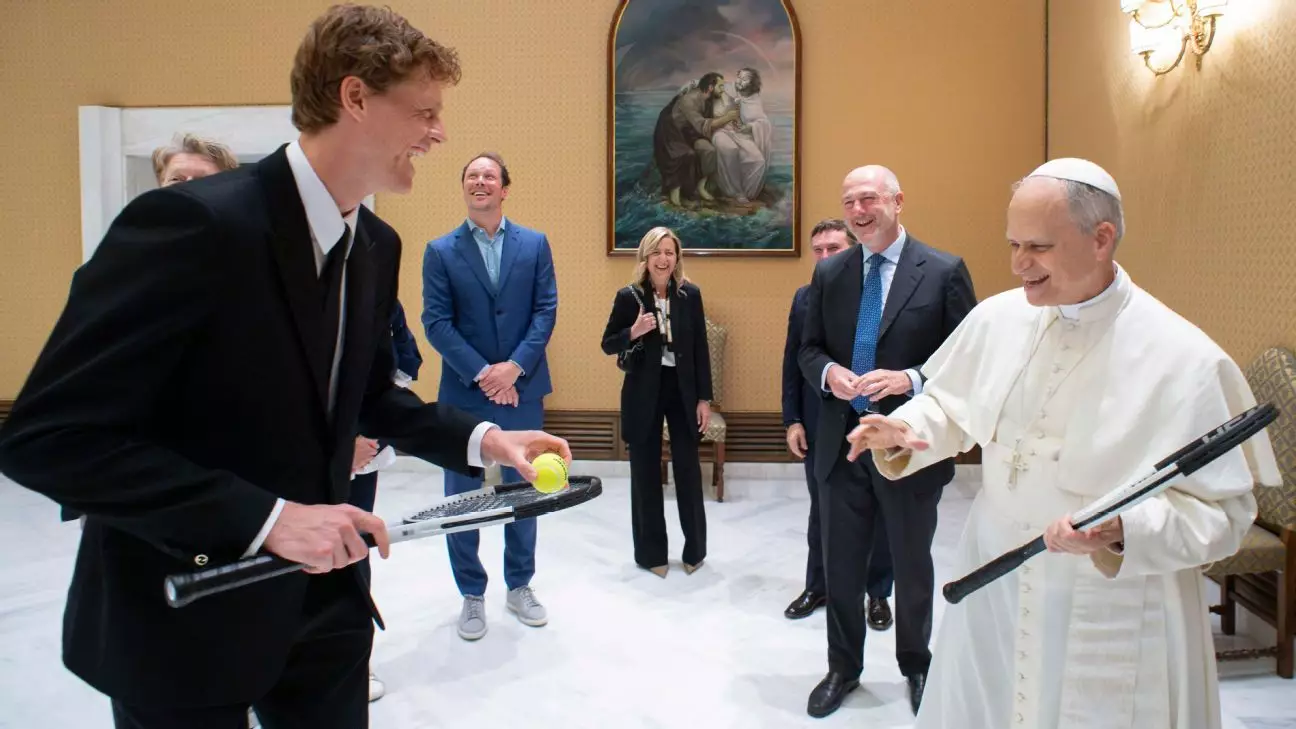In an age where sporting events often connect people beyond their cultural and religious differences, a recent encounter between Pope Leo XIV and tennis ace Jannik Sinner stands as a remarkable testament to this unifying force. Their meeting at the Vatican not only encapsulates the charm of sport but also showcases the remarkable dynamics of faith when intertwined with popular culture. The event was marked by light-heartedness, showing that even the highest authorities are capable of dipping their toes into the ephemeral joys of life.
This meeting took on a special significance as it was not merely a ceremonial visit; Sinner presented the pope with a tennis racket, signifying the intersection of sport and spirituality. Pope Leo’s apparent love for tennis adds another layer of accessibility to his papacy. His quip about not inviting Sinner to play due to the connotation of the player’s surname was humorous, yet it also highlighted a deeper narrative of humility and understanding, which are often pillars of both faith and sport.
Breaking Barriers
Pope Leo XIV stands out as the first American pope, an emblem of modernity, and in recent events, he has shown a commendable effort to bridge the gap between different spheres of society. The meeting with Sinner, a celebrated athlete, serves as an acknowledgment of the universal language of sport. It is rare to see a religious leader engaging openly with athletes, emphasizing that faith can coexist with the contemporary culture of sportsmanship.
Sinner’s recent return to the sport post a doping-related suspension demonstrates his resilience and dedication. The support from Pope Leo XIV may uplift the spirits of many young athletes who have faced similar challenges. The pope’s apparent enthusiasm for a potential charity match reflects an understanding that sports can be a platform for genuine connection, allowing athletes to be mentors and role models beyond their respective fields. This collaboration between the Vatican and the world of athletics could inspire countless young fans and aspiring athletes.
The Role of Sports in Spiritual Community
In many ways, sports have become a modern congregation space, where people gather not just to cheer but also to find unity and camaraderie. The Vatican’s recognition of this is both progressive and necessary. Angelo Binaghi’s acknowledgment of the pope’s passion for tennis is significant; it reinforces that even at high levels of authority, there is a shared love for sport that can break down walls.
The display of trophies, such as the Davis Cup and Billie Jean King Cup, underscores the shared heritage of Italian sportsmanship. It is a symbolic affirmation that, while sports can be fiercely competitive, they also foster collaboration, mutual respect, and shared victories that transcend the individual.
Legacy of Leadership
Through this seemingly light-hearted exchange, Pope Leo XIV showcases the potential of integrating traditional roles with contemporary activities that resonate with the younger generation. Unlike previous popes, who might have garnered attention through more conventional approaches, Leo seems to embrace unorthodox channels for outreach. His connection with sports not only humanizes the papacy but also creates an avenue for greater engagement with secular audiences.
This blend of sporting events and spirituality isn’t merely a novel trend but a possible template for future dialogues between faith leaders and younger generations seeking authenticity in leadership. The world is undergoing rapid transformations, and new connections made in venues such as tennis courts can spark necessary conversations about faith, perseverance, and community building.
As Pope Leo XIV merges the worlds of spirituality and sport, he injects hope and vitality into an age-old institution. His willingness to engage without pretense invites a larger discussion about how diverse cultural elements, like sports, can promote a sense of belonging, particularly in a global landscape that often feels divisive. Thus, while Sinner may be vying for victory on the tennis court, both he and the pope are winning in the overarching game of fostering unity.


Leave a Reply